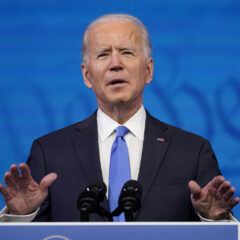‘For where there is discord, union; where there is doubt, faith, where there is darkness, light,’ President-elect Joe Biden said, invoking the Prayer of St. Francis.

President-elect Joe Biden speaks after the Electoral College formally elected him as president, Monday, Dec. 14, 2020, at The Queen theater in Wilmington, Del. (AP Photo/Patrick Semansky)
December 15, 2020
By Jack Jenkins
WASHINGTON (RNS) — President-elect Joe Biden marked his Electoral College win with a religious flair, citing Scripture and the Prayer of St. Francis during his victory speech.
Members of the Electoral College voted in all 50 states and the District of Columbia on Monday (Dec. 15), formalizing Biden’s 306-232 win over incumbent Donald Trump.
The president-elect marked the moment with a speech in Delaware, where he declared “the rule of law, our Constitution and the will of the people prevailed” over multiple efforts by Trump and his allies to challenge the results of the election.
Biden’s rhetoric took a turn for the spiritual near the close of his speech, when he made reference to the biblical passage of Matthew 16:18.
“As we start the hard work to be done, may this moment give us the strength to rebuild this house of ours upon a rock that can never be washed away,” he said.
Biden, a Catholic, then invoked the Prayer of St. Francis by name, saying, “for where there is discord, union; where there is doubt, faith, where there is darkness, light.”
It was one of several religious references Biden has made in major speeches since media outlets first declared him the victor in the presidential election on Nov. 7.
In his first victory speech, Biden quoted the Book of Ecclesiastes and recited lines from the hymn “On Eagle’s Wings.” He also made at least two references to Scripture in his Thanksgiving address later that month, when he recited part of Psalm 28 and implored Americans to remain safe during the pandemic, saying “to love our neighbors as ourselves is a radical act, but it’s what we’re called to do.”
Religious themes have been a constant this year for Biden, whose campaign slogan was the “Battle for the soul of the nation.” Speakers at the Democratic National Convention repeatedly highlighted his faith, Biden’s campaign produced multiple ads targeted at faith voters, and Biden himself kicked off Election Day by visiting his church.
Note:
1. The anonymous text that is usually called the Prayer of Saint Francis (or Peace Prayer, or Simple Prayer for Peace, or Make Me an Instrument of Your Peace) is a widely known Christian prayer for peace. Often associated with the Italian Saint Francis of Assisi (c. 1182 – 1226), but entirely absent from his writings, the prayer in its present form has not been traced back further than 1912.[1]
2. "On Eagle's Wings" is a devotional Hymn composed by Michael Joncas. Its words are based on Psalm 91,[1] Book of Exodus 19, and Gospel of Matthew 13.[2] Joncas wrote the piece in either 1976[3] or 1979,[1][4] after he and his friend, Douglas Hall, returned from a meal to learn that Hall’s father had died of a heart attack.[5] It was recorded in 1979, with Douglas Hall as producer, published by North American Liturgy Resources and later purchased by New Dawn Music, a subsidiary of Oregon Catholic Press. It has become popular as a contemplative hymn at Catholic masses as well as at Protestant services of worship.
It is now sung during services of many Christian denominations, including Pentecostal churches, and was performed at many of the funerals of victims of September 11, 2001 attacks.[citation needed] It is often performed either at the beginning or the ending of a Roman Catholic funeral Mass. It has been performed at many internationally broadcast papal Masses, was selected as part of the 2007 funeral Mass for Luciano Pavarotti in Modena, Italy, also broadcast internationally.[citation needed]
President-elect Joe Biden referenced and recited the hymn in his victory speech on November 7, 2020. He said the song was important to his family and his deceased son Beau, who died of brain cancer in 2015.[6] Composer Michael Joncas was "honored and humbled." [7]
(Wikipedia)
No comments:
Post a Comment